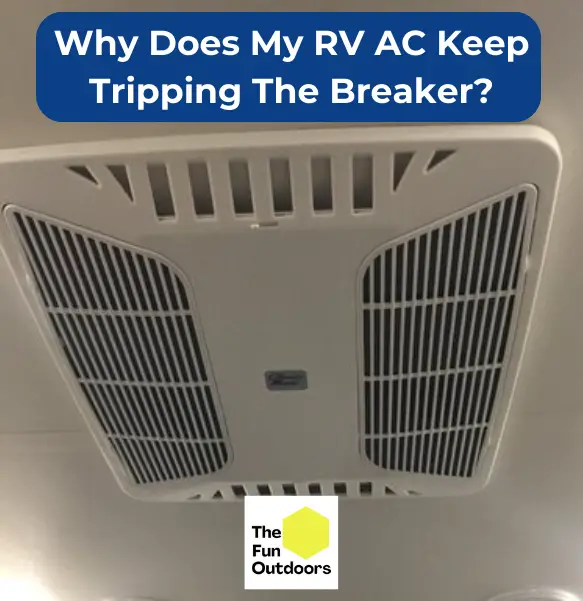It can be an extremely frustrating situation for any RV owner when the RV AC keeps tripping the breaker. But what causes this problem, and how do you fix it?
An RV AC that keeps tripping the breaker is caused by overloading the circuit breaker, dirty air filters, dirty condenser coils, loose wiring connections, an overheating RV AC unit, a grounded compressor, a blown fuse in the AC compressor, a short circuit in the AC motor, a refrigerant leak, or a damaged capacitor.
Understanding what keeps an RV AC breaker tripping can help you troubleshoot and solve the problem. We’ll cover all these causes in depth along with troubleshooting tips and preventative maintenance in this guide.
Key Takeaways:
- RV AC breaker tripping can be caused by a range of issues, from dirty air filters to faulty breakers.
- Troubleshooting steps include checking connections, testing the breaker, inspecting the AC unit, and using a multimeter.
- Professional assistance may be needed for complex or potentially dangerous issues.
- Preventive measures to avoid AC breaker tripping include regular maintenance, proper load management, and using surge protectors.
Why Does My RV AC Keep Tripping The Breaker? Top 10 Reasons
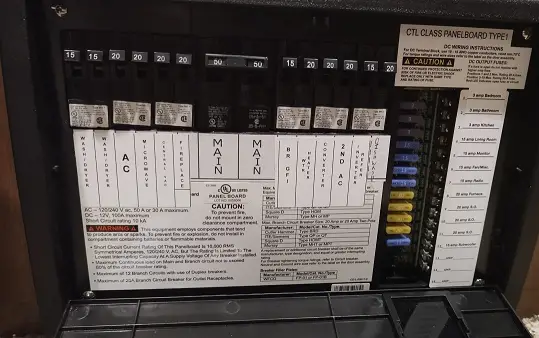
When you turn on your RV air conditioner, and it trips the breaker, it can be frustrating. Understanding why it happens can help you fix the issue and prevent it from happening again.
Here are ten reasons why your RV AC keeps tripping the breaker:
Dirty Air Filter Or Dirty Condenser Coils
A dirty air filter or condenser coils can cause your RV AC to work harder than it should, leading to an overload on the circuit. Make sure to clean or replace the air filter regularly and clean the condenser coils to prevent this issue.
Loose Connections
Loose connections in the AC wiring can cause the breaker to trip. Check all connections and tighten any loose ones to fix the issue.
Overheating on Hot Days
On hot days, your RV AC may overheat, leading to a circuit overload and tripping the breaker. Make sure your AC unit is clean and well-maintained, and consider using a shade or awning to keep it cooler.
The Breaker Is Overloaded
If you have too many appliances running on the same circuit, it can cause an overload and trip the breaker. Make sure to distribute your appliances across different circuits to prevent this issue.
The Compressor Is Grounded
A grounded compressor can cause a circuit overload and trip the breaker. This issue requires a professional to fix.
AC Compressor Has A Blown Fuse
A blown fuse in the AC compressor can cause a circuit overload and trip the breaker. Replace the blown fuse to fix the issue.
Short Circuit In The AC Motor
A short circuit in the AC motor can cause the breaker to trip. This issue requires a professional to fix.
The Capacitor Is Bad Or Damaged
A bad or damaged capacitor can cause the AC unit to work harder than it should, leading to an overload on the circuit and tripping the breaker. Replace the capacitor to fix the issue.
Your AC Unit Has A Refrigerant Leak
A refrigerant leak can cause the AC unit to work harder than it should, leading to an overload on the circuit and tripping the breaker. Fix the refrigerant leak to prevent this issue.
Faulty Breaker
A faulty breaker can cause it to trip even when the circuit is not overloaded. Replace the breaker to fix the issue.
How to Troubleshoot RV AC Breaker Tripping
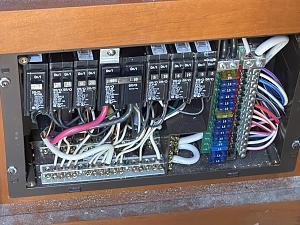
If your RV AC breaker keeps tripping, it can be frustrating and uncomfortable. However, before calling a professional, there are some troubleshooting steps you can take to try and fix the issue yourself.
Checking the Connections
The first step is to check the connections. Make sure that all the wires are connected properly and that there are no loose connections. If there are any loose connections, tighten them with a screwdriver.
Testing the Breaker
The next step is to test the breaker. Turn off the breaker and then turn it back on. If it trips again, you may need to replace it. You can also use a multimeter to test the breaker.
Set the multimeter to the AC voltage setting and test the voltage across the breaker. If the voltage is zero, the breaker is faulty.
Inspecting the AC Unit
Inspect the AC unit for any damage or wear and tear. Check for any loose wires or connections. You can also check the air filter and clean or replace it if necessary.
If there is any damage to the AC unit, it may need to be repaired or replaced by a professional.
Using a Multimeter
A multimeter can be a helpful tool in troubleshooting RV AC breaker tripping. Set the multimeter to the AC voltage setting and test the voltage across the wires connected to the breaker.
If the voltage is low, it may indicate a problem with the wiring or a low voltage supply. If the voltage is high, it may indicate an overloaded circuit.
Professional Assistance for Breaker Issues
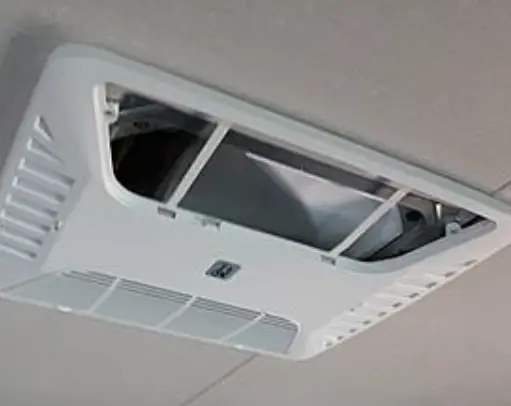
When RV owners encounter breaker issues, they may need professional assistance to resolve the problem. There are two main options for seeking help: hiring an electrician or utilizing RV maintenance services.
Hiring an Electrician
If the breaker issue is related to the RV’s electrical system, hiring an electrician may be the best course of action. Electricians have the knowledge and tools needed to diagnose and repair electrical problems. They can also ensure that the RV’s electrical system is up to code and safe to use.
When hiring an RV electrician, it is important to choose a licensed and insured professional. RV owners can ask for recommendations from friends or family, or search online for local electricians. It is also a good idea to get multiple quotes and compare prices before making a decision.
RV Maintenance Services
RV maintenance services can also provide assistance with breaker issues. These services specialize in maintaining and repairing RVs, including their electrical systems. They may be able to diagnose and fix the problem quickly and efficiently.
When choosing an RV maintenance service, RV owners should look for a reputable and experienced provider. They can ask for recommendations from other RV owners or search online for local services. It is important to choose a service that has experience working with RVs and their unique electrical systems.
In some cases, RV owners may be able to fix the breaker issue themselves. However, if the problem is complex or potentially dangerous, it is best to seek professional assistance.
A licensed electrician or experienced RV maintenance service can ensure that the problem is resolved safely and effectively.
Preventive Measures to Avoid AC Breaker Tripping
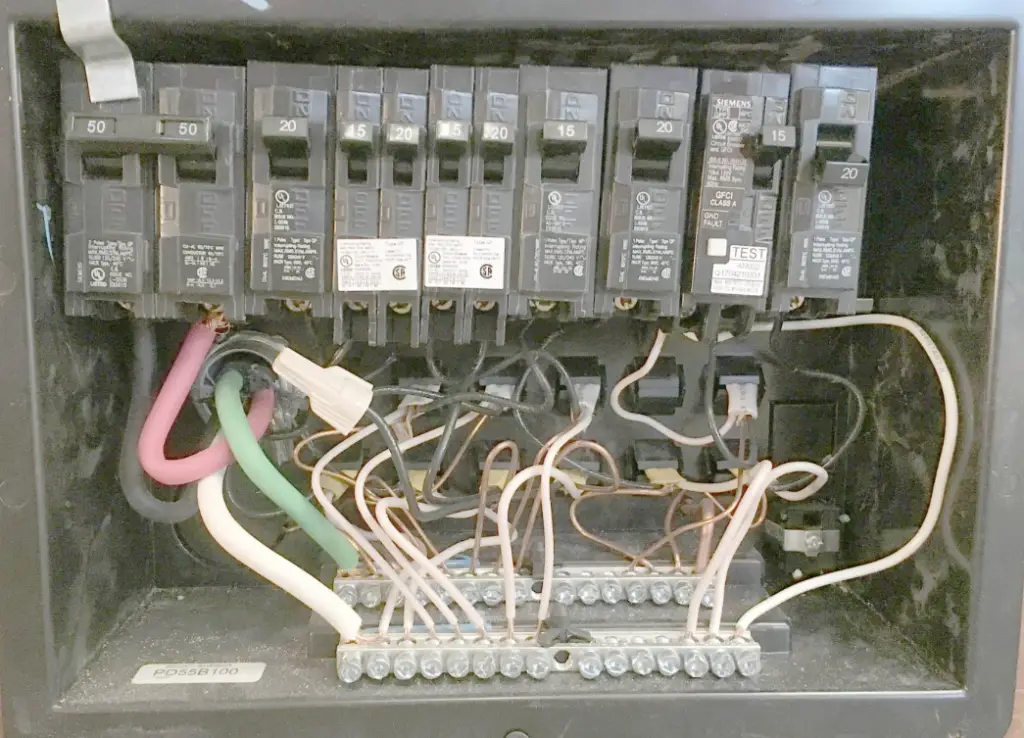
When it comes to RV AC systems, it is important to take preventive measures to avoid AC breaker tripping. Here are some of the best practices that can help RVers avoid AC breaker tripping.
Regular Maintenance
One of the best ways to avoid AC breaker tripping is to perform regular maintenance on the RV’s electrical system. This includes checking the wiring, outlets, and circuit breakers for any signs of wear or damage. It is also important to ensure that the RV’s batteries are fully charged and in good condition, as low or bad batteries can cause the AC breaker to trip.
Proper Load Management
Another way to avoid AC breaker tripping is to properly manage the load on the RV’s electrical system. RVers should avoid running multiple high-demand systems, such as the AC and microwave, at the same time.
It is also important to avoid overloading the circuit with too many appliances or devices. RVers can use a load management system to help distribute the electrical load evenly across the RV’s electrical system.
Using Surge Protectors
Using a surge protector can also help RVers avoid AC breaker tripping. Surge protectors are designed to protect the RV’s electrical system from power surges and spikes that can cause damage to the AC system and trip the breaker.
RVers should use a surge protector that is rated for the RV’s electrical system and that has a high joule rating to provide maximum protection.
Check out our other helpful RV AC related guides while you’re here:
How To Stay Cool In An RV Without Air Conditioning
How To Run RV AC Without A Generator

